Inside the Head of Sarah Jones and the Women of Sell/Buy/Date
For a solo play about sex trafficking, it takes three to make a thing go right.
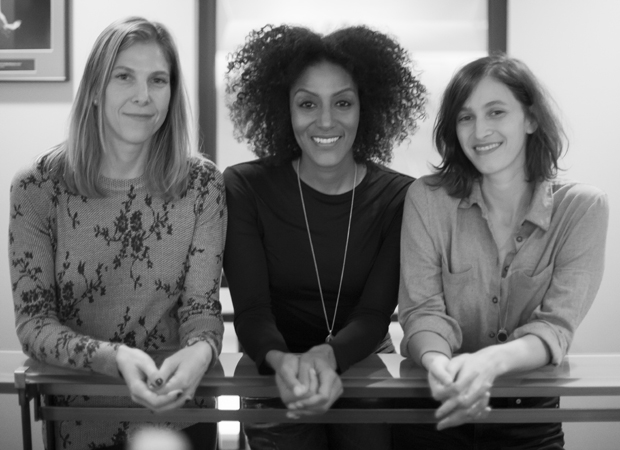
(© Ashley Van Buren)
If you know Sarah Jones, you've probably also met Lorraine Levine, the octogenarian New York Jew; or Bella, the "ah-mazing" feminist millennial (namesake of Bella Abzug); or Gary Weaselhead, the Lakota activist and stand-up comedian.
More than characters, these folks are Jones' friends, confidantes, and mouthpieces for the social and political topics she brings to her solo shows. Her play Bridge & Tunnel, which earned her a Special Tony Award in 2006, told the stories of various Manhattan immigrants. Now back on the New York stage (at MTC's New York City Center – Stage II), Jones' latest project Sell/Buy/Date tackles the global debate over the sex-trafficking industry and the many insidious forms it takes — from pornography, to voluntary sex work, to involuntary prostitution.
Set several generations in the future, the story is framed around a lecturer named Serene. Via the advanced technology of the 2100s, she engages what are called BERT (Bio-Empathetic Resonant Technology) modules to tap into the experiences of the sex workers and clientele of the past and examine them with her class.
After years of research and percolation, Jones enlisted director Carolyn Cantor and dramaturg Antonia Grilikhes-Lasky to help her hit the gas on this project, which the trio brings to audiences with a sense of urgency and, in true Sarah Jones fashion, humor.
"I know, saying, 'Hey, let's all get together for some laughs over some sex trafficking' is not usually what you think of first," says Jones. "But I hope people really enjoy themselves."
I couldn't think of anything more in need of examination .
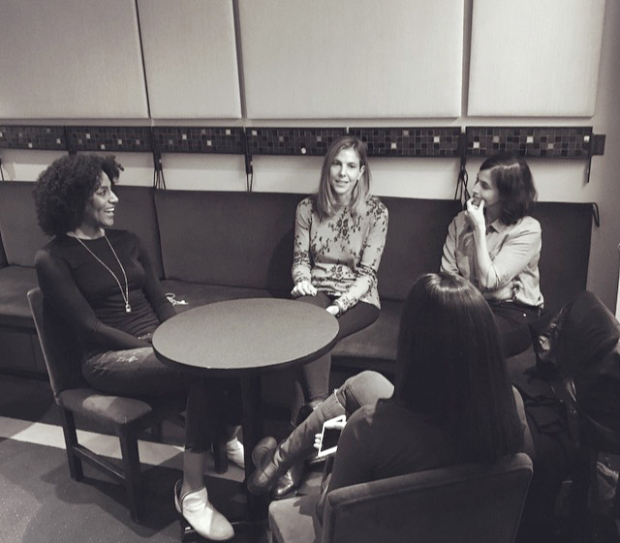
(© Ashley Van Buren)
When did you decide that sex work was the next subject you wanted to write about?
Sarah Jones: I had the idea pretty early because the subject matter was relevant directly in my life. I was stopped in L.A. for walking down the street. I and my Mexican-American friend were stopped because the cops assumed we were soliciting. It blew my mind how we were treated. Thrown over the hood of a car in broad daylight. It was really nuts. We were just so vulnerable to the police. And then I thought, "What if I really were doing that work?" I remember teaching poetry workshops on Rikers Island and meeting girls as young fourteen who had been trafficked and thinking, "These girls are in a place designed to punish bad behavior." I couldn't think of anything more in need of examination than that.
What were your first steps when you started working on Sell/Buy/Date?
Sarah: I went on my first research trip to Korea in 2011. It was an amazing opportunity to go with Gloria Steinem and several other feminists. I wanted to meet the so-called comfort women. These are women who were conscripted by the Japanese army to be sexually exploited by soldiers during World War II. Some of them were still living and I wanted to hear their stories. It was this reminder that the sexual exploitation of women is everywhere in our world in various ways and really deserves to be talked about.
Carolyn and Antonia, when did you both join this project?
Antonia Grilikhes-Lasky: I saw a really early reading at the Nuyorican [Poets Café]. I think you called it "cake batter" in your welcome to the audience.
Sarah: I did call it cake batter. [laughs] Like, "This is some ingredients that have maybe been stirred."
Antonia: I was completely captivated. I walked out feeling so empowered, which was not what I expected going in given the subject matter. I was really excited by what Sarah was doing. Even in the cake batter stage.
Sarah, were you in the market for a dramaturg at the time?
Sarah: I think the play was in the market for a dramaturg. On Bridge & Tunnel I had one director who helped guide that process, but I hadn't ever had dramaturgy. It was new and incredibly helpful to have someone whose job it is to say, "Hey, over here! I know it's fascinating, the prison industrial complex!" I needed that kind of focusing and disciplined attention to the playwriting, which I had never learned. I'm not a trained playwright so I kind of went to grad school at the University of Antonia Grilikhes-Lasky.
Antonia: Not accredited.
When did you come into the picture, Carolyn?
Carolyn Cantor: I read the draft in April of 2015. Sarah got invited to Sundance to work on it there and was looking for a director, so I started working and I met Antonia shortly thereafter when we decided to move forward with the collaboration. I kind of just joined the soup.
Sarah: I feel like this play has its own soul and it is very determined to follow its own path. These two brilliant women help me let it be exactly what it is. I think as a one-person show, that energy can lend itself to a compulsive self-reliance that's not helpful, so it's really great to have eyes I trust.
It really felt like it can't wait.
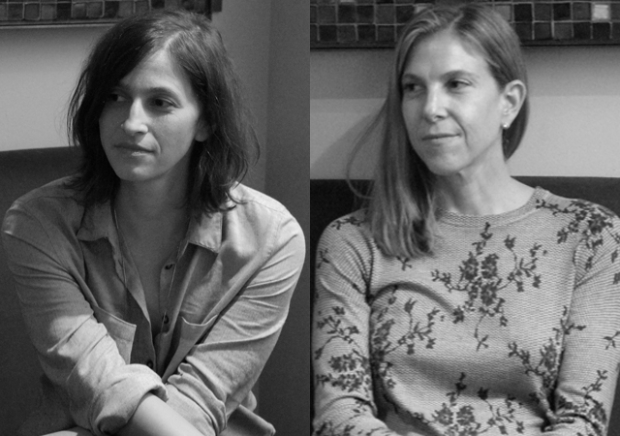
(© Ashley Van Buren)
Carolyn: Sarah felt like, "The time is now…there's an urgency to the material." So we worked as a kind of three-headed—
Sarah: Benevolent monster!
Where did that feeling of urgency come from?
Sarah: I'd been thinking about this for years and all of a sudden I saw, the cover of this magazine: "Sex Work: What Is It?" And I'm like, "Wait a minute!" I'm glad that it's out there. We're just in this moment that desperately needs a substantive conversation about where we are and where we're headed.
Is affecting legislative change one of your goals when you write your plays?
Sarah: Meeting young girls who are in a living hell bouncing between Rikers Island and foster care — the system is broken in my view. And it's not just Rikers Island. It's Sonagachi, the biggest open-air brothel in the world in Kolkata, India. It's the Dominican Republic, where I couldn't even walk down the beach because I was inundated with offers for work from European guys who go to this part of Dominican Republic to find sex workers. I just wanted to share what I've seen. Legislation and cultural shifts have to happen in tandem with each other and I think they always do. If you get that shift in people's consciousness, then politicians follow.
Were all three of you on a similar page when it came to your opinions on the sex industry?
Carolyn: It's an interesting question because we actually didn't talk about that a whole lot.
Sarah: It's less a page and more of this mosaic of ideas. I definitely didn't want to be prescriptive. At my core, I'm interested in the humanity of people and self-determination — whatever that looks like. Part of the reason the piece is set in the future is so we can look back at: What does choice mean? What does empowerment mean? What does exploitation look like, whether around this topic or in general? Leaving the United States, the whole conversation exploded for me. In Sweden, I would say, "In commercial sex…" and they were like, "What does it mean?" They said, "This is not sex, it's violence." They had a completely different framework. It opened my mind to a more complex and richer conversation.
Anybody is redeemable.
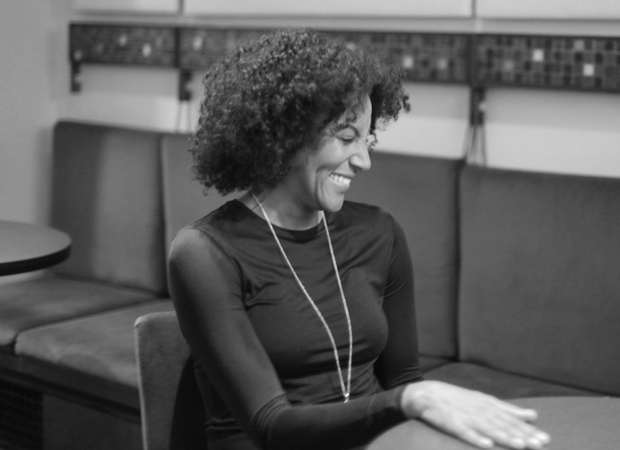
(© Ashley Van Buren)
What kinds of characters did you want to make sure were represented in the play?
Sarah: I like the idea of juxtaposing the millennial voice with an elder person. And they're both thinking about sex! Whadya know! There's a certain kind of timeless, ageless, raceless, genderless quality to our search for — what does meaningful connection look like? Sex is essential to our lives, and when we commodify it, it takes on these really interesting dimensions that are relevant to anybody.
Are there any characters in Sell/Buy/Date that made any of you look at something differently?
Antonia: I think for me, the character of Joey. I'd never really put myself inside the head of a John. I don't think I knew how.
How were you able to get inside the head of a John, Sarah?
Sarah: If I really take the time to let go of my rancor — and it might be justifiable anger, looking at how someone behaves in the world and thinking this is totally unacceptable. That said, what makes a person behave that way? What kind of personal historical narrative must one have to behave in some of the ways people behave? There always seems to be a hurt soul underneath the violence and prejudices. The behavior we're seeing now on our world stage and run-up to this election— I'm convinced that if anything, there's just a very sick confused person who needed some healing way back when and didn't get it. But I really believe anybody is redeemable. Everyone has a core humanity that just gets masked by certain experiences. So that makes it easier.
Carolyn: Sarah believes the point of view that that character is presenting. Even if all three of us come down very strongly on one side or the other of this argument, hopefully it creates a balanced piece that lets the audience think about the topics and make up their own mind. Sarah's an extraordinary writer and performer of character. She really finds these people and gets inside of them and, as far as I can tell, genuinely loves them all.
Sarah: I really do. [laughs]
That kind of empathy is essentially the basis of the play. The main character Serene taps into different BERT modules to channel people's past experiences. Is empathy an underlying philosophy of all of your character work?
I do like the idea of empathetic resonance. What does it mean to have someone else's experience resonate with me to the point that I'm more able to have compassion and more able to imagine them changing? I think that's our only hope. If we really believe people have the capacity to change, then we'll work to do that instead of just building walls.
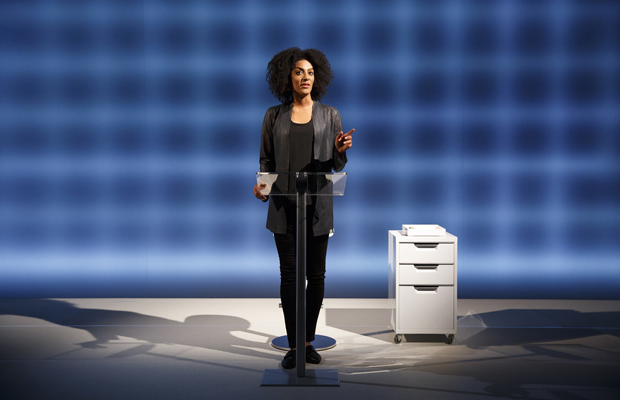
(© Joan Marcus)








